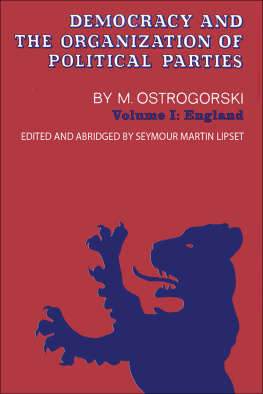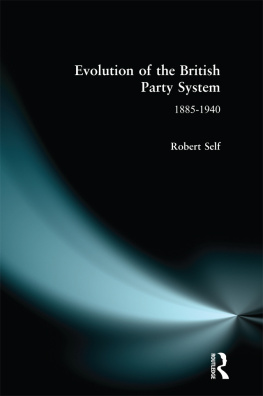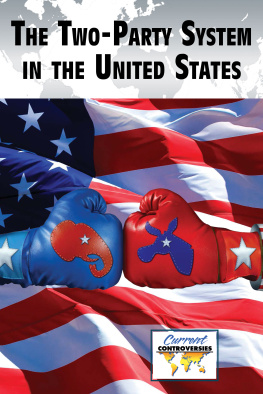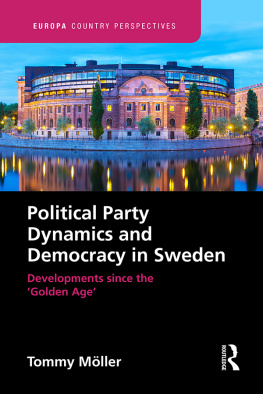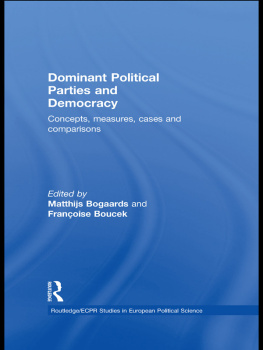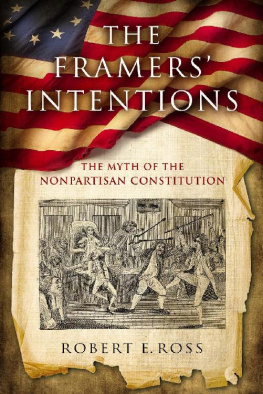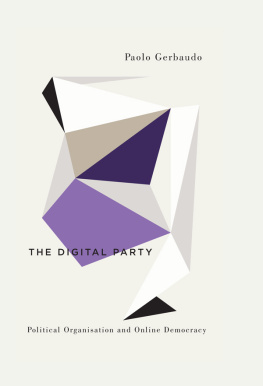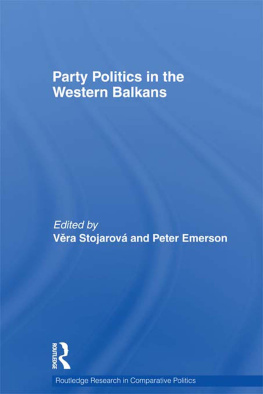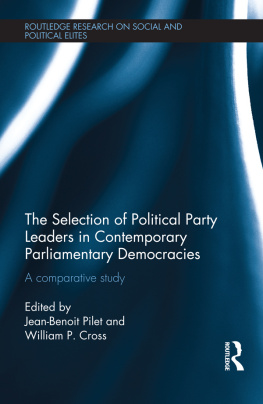DEMOCRACY AND
THE ORGANIZATION OF
POLITICAL PARTIES
DEMOCRACY AND
THE ORGANIZATION OF
POLITICAL PARTIES
BY M.OSTROGORSk
Volume I: ENGLAND
EDITED AND ABRIDGED BY SEYMOUR MARTIN LIPSET
First published 1964 by Anchor Books and by Quadrangle Books, Inc.
Published 1982 by Transaction Publishers
Published 2017 by Routledge
2 Park Square, Milton Park, Abingdon, Oxon OX14 4RN
711 Third Avenue, New York, NY 10017, USA
Routledge is an imprint of the Taylor & Francis Group, an informa business
Copyright 1964 by Seymour Martin Lipset.
All rights reserved. No part of this book may be reprinted or reproduced or utilised in any form or by any electronic, mechanical, or other means, now known or hereafter invented, including photocopying and recording, or in any information storage or retrieval system, without permission in writing from the publishers.
Notice:
Product or corporate names may be trademarks or registered trademarks, and are used only for identification and explanation without intent to infringe.
Library of Congress Catalog Number: 81-2862
Library of Congress Cataloging-in-Publication Data
Ostrogorski, M. (Moisei), 1854-1919.
Democracy and the organization of political parties.
(Social science classic series)
Translation of: La dmocratie et lorganisation des partis politiques. Reprint. Originally published: Chicago: Quadrangle Books, 1964. Includes bibliographical references.
Contents: v. I. 1. Englandv. 2. The United States.
1. Political partiesEngland. 2. Political partiesUnited States. 1. Lipset, Seymour, Martin. II. Title. III. Series.
JF2051.085 1982 324.24209 81-2862
ISBN 0-87855-877-2 (pbk.: v. 1) AACR2
ISBN 0-87855-878-0 (pbk.: v. 2)
ISBN 13: 978-0-87855-877-3 (pbk) (Vol. I)
ISBN 13: 978-0-87855-878-0 (hbk) (Vol. II)
Table of Contents
THERE is a great dearth of secondary literature on Ostrogorskis life and works. As far as I can discover, no one has written a book or even a long biographical article about him. Part of this gap may be explained by the fact that, while he is best known for his writings on the United States and Britain, he is a Russian. American and British scholars who have been interested in his writings on their countries have usually been experts on domestic politics and hence unlikely to know the Russian language. Those interested in Russian thought have paid little attention to him since his major works were never published in the Russian language. And political scientists, not being concerned with general social science theory until recently, have on the whole treated Ostrogorski as a source of historical data, rather than as someone who should be studied as an important theorist. As yet, therefore, one cannot draw on existing work to relate his experiences and intellectual background to his writings.
Moisei Ostrogorski was born in Grodno in Russia in 1854. He was educated in law at St. Petersburg and worked for some years in the Ministry of Justice. Subsequently, while in his late twenties, he went to Paris where he studied at the cole Libre des Sciences Politiques under mil Boutmy. His work there resulted in a volume on the rights of women in public law, which won a prize from the Paris Faculty of Law in 1892. He turned to the study of parties in the United States and Britain and spent many years in both countries during the 1880s and 1890s. During this time he published a number of articles on American parties in French and American journals. His two-volume treatise on the subject was published in English in 1902, and curiously did not appear in French, the language in which it was written, until a year later.
Although Ostrogorski lived for seventeen years after the publication of these volumes, he did not follow them up with any other major scholarly works. He returned to Russia after the first Revolution of 1905 and was elected to the First Duma in 1906, as a representative of the liberal Constitutional Democratic Party (Cadets). He played an important role in the party caucus during this first parliament, but withdrew from active politics when it was dissolved. He returned briefly to the United States to revise and condense his volume on American politics. That version appeared in 1910. Just after World War I, he published some articles in Russia on British constitutional history. I have found no record that reports his role in, or reactions to, the Revolutions of 1917. He died in 1919.
S.M.L.
* These facts are largely drawn from the article on him by Arthur Macmahon in the Encyclopedia of the Social Sciences, Vol. XI, (New York: Macmillan, 1933), pp. 503-504.
SEYMOUR MARTIN LIPSET
As soon as a party, even if created for the noblest object, perpetuates itself, it tends to degeneration.
Moisei Ostrogorski
It is organization which gives birth to the domination of the elected over the electors, of the mandataries over the mandators, of the delegates over the delegators. Who says organizations says oligarchy.
Robert Michels
Power tends to corrupt and absolute power corrupts absolutely. Great men are almost always bad men even when they exercise influence and not authority: still more when you add the tendency of certainty of corruption by authority
John Lord Acton
IT is an interesting commentary on the state of political life that the three men quoted above have won increasing reputations as prophetic and brilliant analysts largely as a result of the popularization of statements such as these. A world that saw a war to make the world safe for democracy end with the destruction of the opportunities for democracy first in Russia and then in Italy, that witnessed the triumph of Nazism and the transformation of Bolshevism into totalitarianism, and that since World War II has observed the emergence of one-party regimes with little respect for the rule of law in many of the new nations of Asia and Africa has been ready to re-examine the assumptions of rational democrats that democratic politics can lead to humane and moral ends. Pessimism, rather than optimism, about the uses of power has become increasingly prevalent. Many socialist movements have questioned and rejected their historic commitment to resolve social and political problems by a drastic increase in state ownership and power. In the United States, the very term populism, meaning an emphasis on the direct rule of the people even at the expense of other values such as civility or privacy, has taken on an invidious connotation among many left-of-center supporters who, as a result of the rise of totalitarian mass movements in other countries and the experience with McCarthyism in the United States, now acknowledge that the rule of law, a Constitution not easily accessible to popular passions for amendment, and judges appointed for life, are all positive traits necessary to protect the polity from the popularly based excesses always potentially present in a democratic society.
Of the major political analysts who called attention to the dangers inherent in political organization and power in the late nineteenth and early twentieth centuries, Moisei Ostrogorski, the author of this book, is the least known to the literate public of the English-speaking world. The relevant writings of Acton and Michels have been republished in a number of editions, including paperbacks, since the end of World War II. Ostrogorski, on the other hand, has been out of print for some decades. This is curious, for he did not write about esoteric materials, nor has he failed to gain recognition among those interested in the analysis of politics. His major books, the two volumes of

